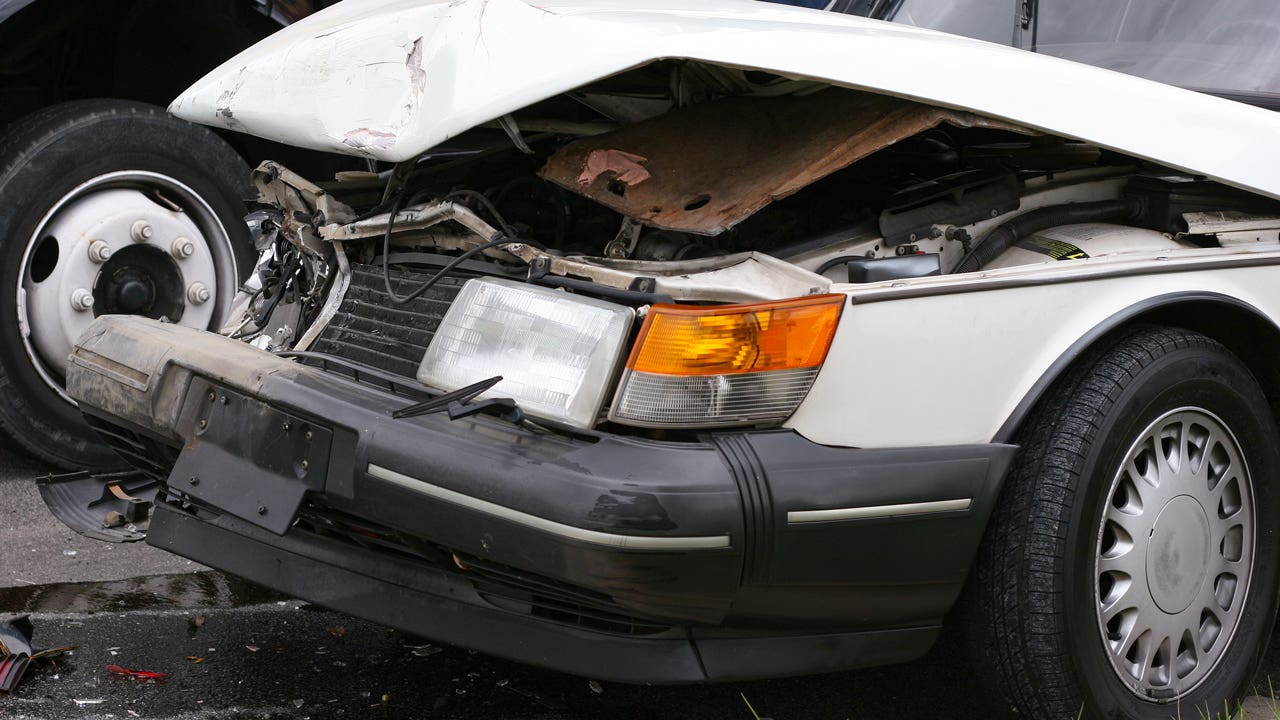What is a rebuilt title vs. a salvage title?

If a car is declared a total loss by an insurance company, that doesn’t mean it’s automatically destined for the scrapyard. While totaled cars are marked as destroyed with a salvage title, that salvage title can be converted to a rebuilt title if somebody repairs the totaled vehicle to make it roadworthy. Buying a car with a rebuilt title could get you a good price, but it’s important to understand the implications of salvage and rebuilt titles, including potential insurance complications.
Salvage vs. rebuilt title: What’s the difference?
Salvage title and rebuilt title are both terms used to describe cars that have been declared totaled by an insurance company. The key difference is what has happened to the vehicle since. Cars get a salvage title when an insurer deems them a total loss and a rebuilt title means they have been repaired to a drivable state.
What is a salvage title?
When an insurer determines that a vehicle’s repair costs outweigh its market value, the vehicle is deemed totaled. At that point, the title of the vehicle will be designated a salvage title.
Some of the most common reasons why a car might have a salvage title are accidents and weather (especially flood damage). Vehicles given a salvage title may not be safe to drive due to their extensive damage.
People may want to buy cars with salvage titles for many reasons. Some may plan to use their functional parts to repair other vehicles; others may attempt to repair the car to a drivable state.
What is a rebuilt title?
When a salvage car is repaired, it can get a rebuilt title — meaning that it is now safe and legal to drive on the road. This notifies the buyer of the previous history of the vehicle.
Each state determines its own rules about when a car must be declared a total loss and titled as a salvage vehicle. Likewise, states can set their own requirements for testing to determine if a salvage-titled car can be converted to a rebuilt title. How old a vehicle is, what percentage of its fair-market value it needs in repairs and more can all fit into state regulations about determining when a car must be declared salvage. In many cases, states may require a rebuilt vehicle to pass a series of inspections to verify its safety and functionality before allowing it to be retitled. The specifics can vary by state, with the process being easier in some than in others.
How does a rebuilt title affect the value of a car?
A rebuilt title will tend to decrease the value of a vehicle by a fair amount. The price drop usually ranges from 20 percent to 40 percent. After incurring such significant damage, even with effective repairs and a careful eye, it may not be possible to fully restore a totaled vehicle to its original condition. Buyers should be wary of lingering issues that may appear down the road.
Keep in mind that the 20 percent to 40 percent value reduction is an industry rule of thumb — not a strict rule. Every car is different, and the type of damage a vehicle endures could play a big role in how much its value is impacted. The value of a salvage or rebuilt title car should be assessed on a case-by-case basis.
The cost to repair or replace your car is one of the biggest factors in determining your insurance rates. In general, the more expensive your car is to fix or replace, the higher your premiums are likely to be. Even with a basic liability policy, your vehicle’s value can still influence what you pay.
With salvage and rebuilt titles, things can get a bit more complicated. Both types of titles are directly tied to your car’s value, and that value plays into how insurers calculate your rate. A rebuilt title means the vehicle was previously declared a total loss but has been repaired and passed a state inspection. Still, many insurers see rebuilt vehicles as higher risk. That’s because hidden or lingering issues could exist, and they may have doubts about the quality of repairs.
If an insurer does agree to cover a rebuilt title, the premium may be higher than you’d expect based on the car’s lower market value. While the rebuilt status reduces the vehicle’s value, it can simultaneously raise the risk associated with insuring it and push insurance costs up.
Should you buy a car with a rebuilt title?
Many experts advise against buying a car with a rebuilt title due to the potential for mechanical issues down the road. However, every situation is different, and for some shoppers, the advantages of buying a car with a rebuilt title could outweigh the risks.
The primary risk of buying a car with a rebuilt title is safety. While the car must pass inspection to receive the rebuilt title, state inspection requirements can vary significantly, and it’s possible the vehicle could have mechanical issues that went undetected. This leaves you with the potential for future breakdowns, accidents and the associated costs.
For many drivers, this risk is significant enough to make the savings of a rebuilt title not worth it. However, if you’re confident in your vehicle repair skills — or if you’re looking for a project rather than a reliable daily driver — you may decide that you’re comfortable with the risk of a rebuilt title.
If you’re considering purchasing a car with a rebuilt title, do your research before you buy. Look into the type and extent of damage the vehicle sustained, the repair process and the mechanic(s) that performed it, and the inspection that the car passed in order to receive the title. You may also want to contact your insurance company to see if it is comfortable insuring a car with a rebuilt title.
Pros and cons of salvage and rebuilt titles
| Pros | Cons |
|---|---|
| Lower purchase price | Potential for ongoing mechanical issues |
| Potential to save on financing costs | Possibility of unseen or undisclosed damage |
| May be an ideal “project car” | May have higher insurance rates compared to vehicle value |
How to get insurance with a salvage or rebuilt title
Salvage cars are not insurable with auto insurance as they are defined by not being road safe or legal, but you may be able to cover them with another type of property insurance while they await repairs. Rebuilt titles are technically road safe and can be insured, but many insurers are hesitant to offer coverage for such vehicles due to the perceived safety and maintenance risks.
Even after the necessary repairs are made, many car insurance companies may only offer liability coverage. Some will not offer full coverage for salvage or rebuilt vehicles because it is challenging to assess the car’s value. Others might not offer coverage at all due to the potential of undisclosed or unseen damage that makes rebuilt vehicles more risky.
The best way to get car insurance for a salvage title is to consult a licensed agent. Once you find a willing company, you may be required to provide a statement from a professional mechanic indicating that your vehicle is in good working condition. You may also need pictures that show its present condition and repair receipts.
Frequently asked questions
Why we ask for feedback Your feedback helps us improve our content and services. It takes less than a minute to complete.
Your responses are anonymous and will only be used for improving our website.
You may also like

What to do with a damaged car after a hurricane

Recoverable depreciation in home insurance: What it is and how it works

What’s the difference between a home renovation and a remodel?





